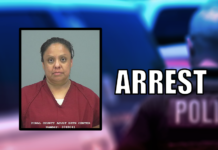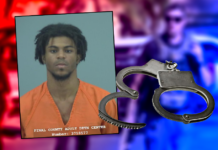
The Maricopa City Council agreed to buy 43 body cameras for police officers during its Feb. 3 meeting.
Of the $97,000 price tag, just under $21,000 was paid with a grant.
The police department had a 10-month pilot program testing three cameras on a DUI grant. It also developed a policy “vetted by 18 months of research through the International Association of Chiefs of Police, the Police Executive Research Forum and several different agencies across the United States,” Chief Steve Stahl said.
More locally, the Maricopa Police Department looked at results in the Surprise and Mesa police departments.
Stahl said there has been growing support among police officers for the use of on-body cameras. Stahl, who was part of the pilot program at the Mesa PD, said the use of the body cameras has been responsible for a 70-percent reduction in complaints against police.
Surprise learned a key to that was letting citizens know they were on camera. Stahl said there was no reduction in complaints until Surprise PD created a policy that officers should make every attempt to let people know about the on-body camera.
“Not only does it correct the citizen’s behavior, but it corrects the officer’s behavior so that the interaction is much more friendly,” Stahl said.
Councilmember Nancy Smith said while she sees the growing support for body cameras, she is concerned for residents’ privacy.
“We think about the safety of our officer, but we don’t think about the fact that these cameras are going into people’s homes and their right to privacy,” she said.
Stahl said that is why it is part of MPD policy that officers “shall make every attempt to let the resident or whomever they’re in contact with know that they are being video recorded at that moment.”
He said some incidents happen too quickly for that information to be conveyed. In some incidents, such as a “covert operation,” he said, the police may not wish to share that information on the scene.
If citizens do not wish to be recorded, they can let the officer know, and then it will be up to the officer’s discretion. If the recording will be important in evidence or investigation, the officer may tell the residents “as politely as possible” the recording will continue, the chief said.
Being police property, the recordings become public record. Once a recording is downloaded into the MPD system it is treated like other records that may be requested through the Freedom of Information Act (FOIA).
Stahl said that raises the question of protecting people’s privacy such as the contents of a home and the identities of any children present at the time of the incident. Just as a written report can be redacted, Stahl said the program has a redacting component that allows police to blur out information the general public has “no right to see.”
During the 10-month pilot program, MPD received only two FOIA requests for a video recording. Stahl said one was for a court record and the other was for a person involved in an incident who wanted it “for posterity.”
Redacting files is part of the responsibilities of three personnel at MPD. Stahl said larger departments have full-time employees dedicated to just that task.
“We are very respectful of the city budget and the constraints right now, so we will do it with our three people,” he said. “We may not be as expeditious in responding to the FOIA requests but we will do it as quickly as time will allow us.”
People involved in a recorded incident have more right to more of the video than others, Stahl said. A person not involved but requesting a copy will receive a highly redacted version.
Councilmember Henry Wade asked how well the law enforcement community is embracing the on-body cameras.
Stahl said because the topic has been part of the police conversations for three years and there has been a fine-tuning of procedures and policy, support has grown in the ranks. Officers having input in the policy was of most importance.
He said during MPD’s pilot program with three cameras, the “techie officers” put the cameras through the works and helped the department create its policy.
“Now everybody wants the camera because they know it helps them do their job,” Stahl said.



![Alleged car thief released without charges Phoenix police stop a stolen vehicle on April 20, 2024. [Facebook]](https://www.inmaricopa.com/wp-content/uploads/2024/04/IMG_5040-218x150.jpg)












![Who’s the Best Mom InMaricopa? Nominate now! Marlene Marshall, Christina Olivares, and Meghan Bremer. [Bryan Mordt]](https://www.inmaricopa.com/wp-content/uploads/2023/05/BCM_8465-100x70.jpg)